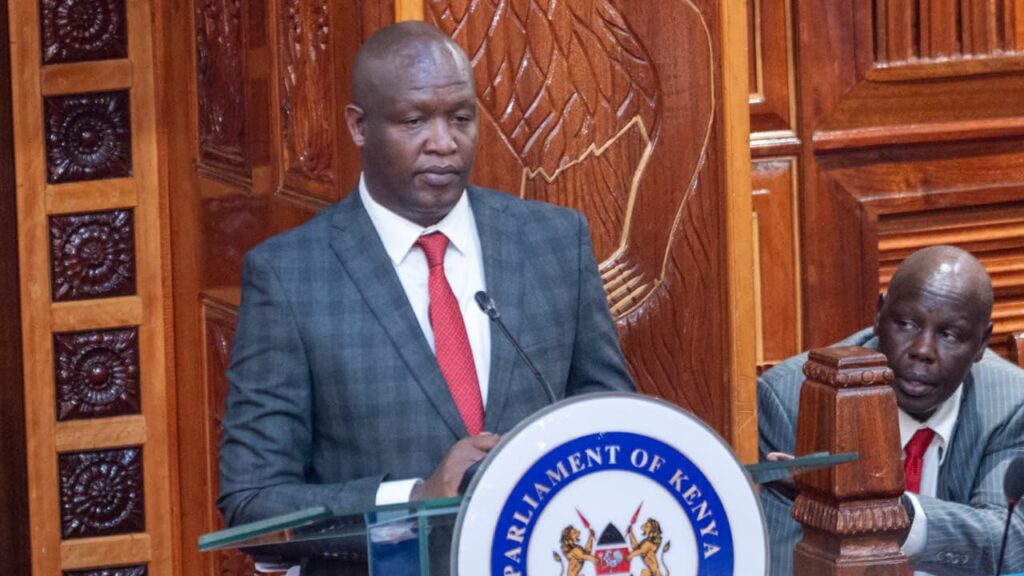
Senate to commence Kericho Governor Mutai’s impeachment proceedings » Capital News
NAIROBI, Kenya, Aug 27 – All is set for the Senate to commence the impeachment hearings of Kericho Governor Eric Mutai, with proceedings scheduled to run between Wednesday and Friday.
The plenary hearings, which will see the full House sit as a trial court are expected to be tense and closely scrutinised as they determine the Governor’s political fate.
The process will formally begin on with the reading of the charges against Governor Mutai. At that stage, the Governor will be required to enter a plea, either admitting or denying culpability.
Once this is done, the County Assembly, which initiated the impeachment process, will present its case first, setting out evidence and arguments to justify the removal of the Governor.
Members of the Assembly’s legal team will not only table documents but will also cross-examine witnesses to substantiate their allegations.
The Governor, through his defence team, will then be afforded the opportunity to respond. He is expected to counter the accusations, provide his own witnesses that will also be subjected to cross-examination.
After both sides have been heard, the Senate will debate the Motion before casting a decisive vote on Friday. It will require a majority of delegations voting by county to either uphold or dismiss the charges.
The charges facing Governor Mutai spread across three main grounds, gross violation of the Constitution and other laws, abuse of office and gross misconduct. This is the second time in less than a year that Mutai finds himself facing impeachment proceedings before the Senate.
According to particulars read to the House last week by Speaker Amason Kingi, the County Assembly alleges that the Governor presided over a series of financial irregularities that drained public resources and undermined service delivery.
Central to the claims is the misappropriation of county funds through fictitious payments for goods and services that were either never supplied or only partially delivered. The Assembly estimates that at least Sh85.7 million was lost in such fraudulent transactions.
The irregularities include questionable expenditures such as maintenance of fifteen residential houses that were never serviced, undelivered agricultural inputs such as soya beans and maize germ and grossly overpriced items.
Among the cited cases are soda bottles allegedly bought at Sh500 each, tissue paper procured at Sh2,750 per bale and hand towels charged at Sh3,600 apiece. The Assembly also points to payments worth Sh5.1 million made to various companies, including Mengro Products Limited and Hildama Construction without any supporting documents.
The charges further detail instances where contractors were allegedly paid twice from retention accounts for projects completed more than five years earlier, raising questions of deliberate fraud.
Additionally, the Assembly accuses the Governor of contravening procurement laws by failing to set up tender committees, bypassing professional evaluations, splitting contracts to avoid open tendering and sanctioning advance payments even while the county battled pending bills amounting to Sh1.1 billion.
The Governor’s management of major development funds is also under scrutiny. The Assembly’s Ad Hoc Committee on Alleged Fictitious Payments had previously flagged irregularities in the National Agricultural Value Chain Development Project (NAVCDP), claiming that funds amounting to Sh351 million were misappropriated. The report indicates that farmers’ cooperatives across thirty wards were meant to benefit, yet only nineteen did and even then, supplies were of poor quality and lacked delivery notes.
Similarly, under the Financing Locally-Led Climate Action (FLOCCA) Fund, Mutai is accused of favouring his home ward of Chemosot, which allegedly received projects worth Sh21.7 million, while several other wards were left out altogether.
He is also faulted for mishandling funds raised for victims of the Londiani junction road tragedy, where more than Sh9 million contributed by the public reportedly went missing.
On the charge of abuse of office, the Governor is accused of nepotism and favouritism in appointments. He is said to have employed his brother as a revenue clerk, confirmed the wife of his aide as a nurse ahead of long-serving contract staff and unlawfully appointed a County Attorney despite a substantive holder being in office.
The latter appointment was later nullified by the Employment and Labour Relations Court, which directed the Governor personally to pay Ksh.2 million in costs.
Further, the Assembly claims Mutai misled the public by advertising vacancies for doctors, nurses and ECDE teachers despite knowing the county lacked the financial capacity to recruit them. He is also accused of irregularly deploying health workers without consulting the County Public Service Board, leading to confusion in service delivery.
On the charge of gross misconduct, the Governor is accused of leading an unlawful invasion of private land in Kericho town soon after assuming office. Together with a mob, he allegedly demolished a fence and designated the land as a county dumpsite, an act carried out without approval from the National Environment Management Authority, without gazettement and in outright defiance of a court order.
Majority Leader Aaron Cheruiyot had initially moved a Motion to establish a select committee to handle the proposed removal through impeachment but it collapsed after Minority Leader Stewart Madzayo declined to second it paving way for the full plenary hearing.